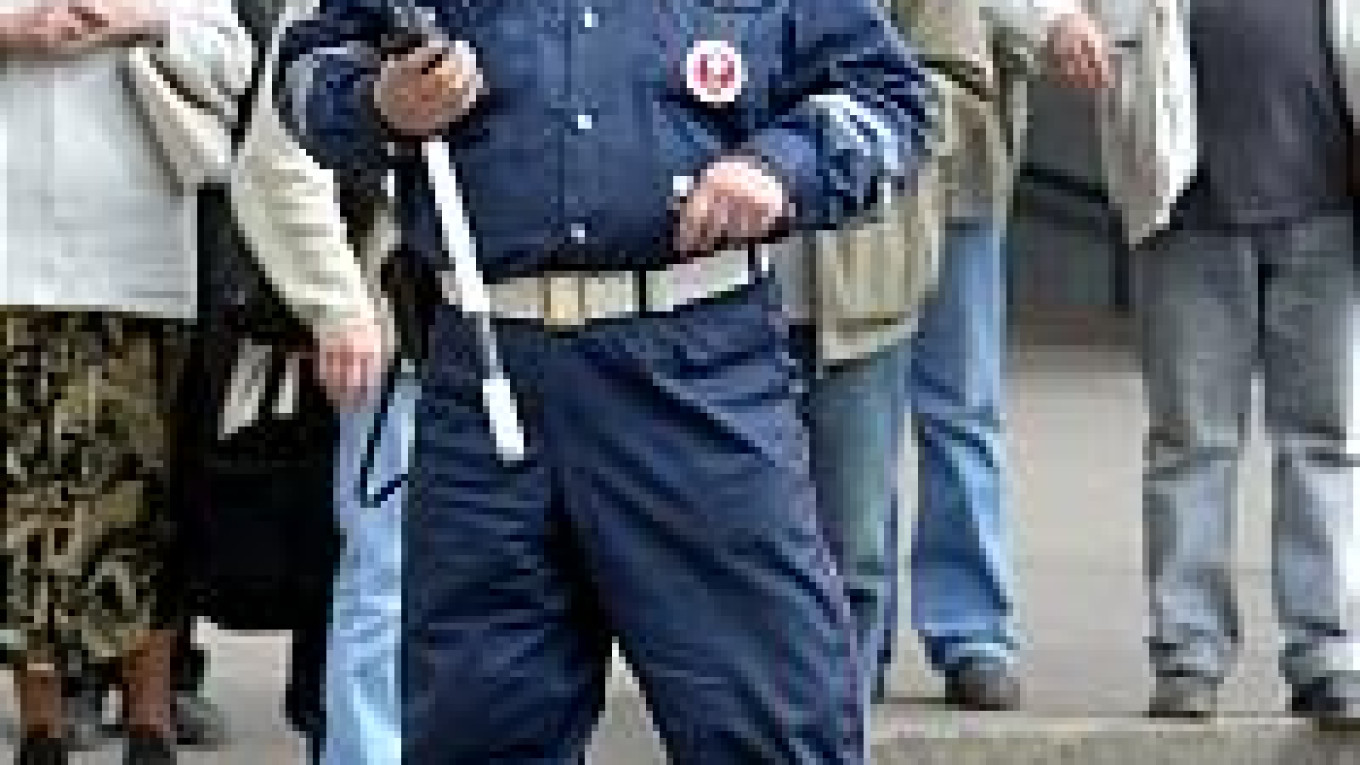But, as always, everybody's a critic. Traffic police officers complain that drivers don't recognize them in their new outfits and are refusing to stop when flagged down. Drivers say the officers look like clowns. And even Zaitsev has disowned the uniform, saying it isn't what he originally envisioned.
Traffic police officials said the new uniforms are not an attempt to improve the image of the State Road-Traffic Safety Inspectorate, whose officers are feared by even rule-abiding drivers for their notorious habit of extorting bribes. Instead, the uniforms were introduced nationwide this month for purely practical reasons: The navy blue outfits adorned with light-reflecting stripes are more visible on the road, while the fabric is more porous so officers don't sweat.
The new design also will help drivers distinguish traffic officers from other members of the police force, said Moscow traffic police spokesman Vyacheslav Trubin.
"It will be a sign to drivers that they are dealing will traffic policemen whose demands are legitimate," he said.
Trubin said officers directing traffic on Moscow's main streets have already received the new uniforms, while most other officers are continuing to wear the old uniforms for the time being. Also, hats to match the new uniforms have not yet been released, so all officer ore wearing the old gray ones.
The new uniforms, which have a windproof, water-resistant version for cold weather, are not exactly new: Zaitsev drew up the original design almost 10 years old. His spokesman, Sergei Shaparev, said the design has been modified since it was submitted to the Interior Ministry and Zaitsev has no desire to discuss the end result.
Trubin said he does not know who redesigned the uniform. "We were not asked to choose a fashion designer, but obviously it was not Versace," he said.
Alexander, a chubby 32-year-old sergeant who mans the busy intersection of 1st Tverskaya-Yamskaya Ulitsa and Lesnaya Ulitsa near Belorusskaya metro, said the uniform has its good points.
"I used to sweat a lot in that old one, which was made from wool. This new one is much better, at least in summer," said Alexander, who was reluctant to be interviewed and photographed and refused to give his last name.
He might have been worried about a new Interior Ministry crackdown on corrupt traffic police officers. Interior Minister Boris Gryzlov on Tuesday urged drivers to be more vigilant about turning in dirty officers. He even called on drivers to take pictures of them and send the photographs to the ministry's internal affairs department.
Alexander complained that some drivers are ignoring his orders to stop after apparently failing to recognize him as a traffic police officer.
Perhaps to avoid such a problem, the Perm region's local television station is running a minute-long public announcement with images of the traffic police officers in their new uniforms. A voiceover explains that the traffic police should not be confused with air force officers or any other official wearing navy uniforms.
Some Moscow drivers said the new look of the traffic police was confusing but has not changed the officers' mean habits.
"When I paid a fine to traffic police officers last Friday, I had the feeling that I was paying a parking lot attendant or a private guard. In these new uniforms they look like clowns," said Alexei, 30.
Trubin said that ignoring an officer's orders to stop because he is unrecognizable in his uniform is a poor excuse for drivers.
"The one thing that has remained unchanged is the baton that every policeman has in his hand," he said.
A Message from The Moscow Times:
Dear readers,
We are facing unprecedented challenges. Russia's Prosecutor General's Office has designated The Moscow Times as an "undesirable" organization, criminalizing our work and putting our staff at risk of prosecution. This follows our earlier unjust labeling as a "foreign agent."
These actions are direct attempts to silence independent journalism in Russia. The authorities claim our work "discredits the decisions of the Russian leadership." We see things differently: we strive to provide accurate, unbiased reporting on Russia.
We, the journalists of The Moscow Times, refuse to be silenced. But to continue our work, we need your help.
Your support, no matter how small, makes a world of difference. If you can, please support us monthly starting from just $2. It's quick to set up, and every contribution makes a significant impact.
By supporting The Moscow Times, you're defending open, independent journalism in the face of repression. Thank you for standing with us.
Remind me later.


